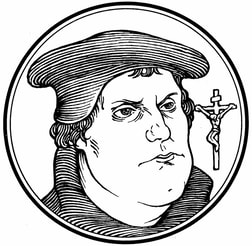 Martin Luther is well known for translating the Bible into the German language so that the German people could hear God's Word in their own language. But Luther also took his translating pen to worship. In 1526, he published the Deutsche Messe (the German Mass), which provided a worship service in the German language, which up to that point had only been available in Latin. While Luther did not despise the Latin language (he had also produced a revision of the Latin service three years earlier), the Deutsche Messe gave the German people a way to praise God in their own language. Luther did not write completely new texts for worship. He took the historic texts of the liturgy and provided an "amplified" translation where he not only translated, but also expanded on their meanings. He also wrote music to accompany his texts (Luther was also an accomplished musician). He set the Scripture readings and Words of Institution to traditional chant tones as well. In fact, the only thing that wasn't sung in the Deutsche Messe was the sermon! German is no longer the common language for North American Lutherans, but Luther's German Mass is available in English as Divine Service, Setting 5 on page 213 of Lutheran Service Book. While the words are in our language, Luther's music can still sound a little foreign. He uses musical scales that were popular in the Middle Ages, but more than that Luther uses the music to confess the text. This results in some awkward and unexpected musical movement. Below are some recordings of the five main hymns of Divine Service, Setting 5, which will help you become more familiar with Luther's service in the common language.
Comments are closed.
|
BlogCategories
All
SearchArchives
July 2024
|
